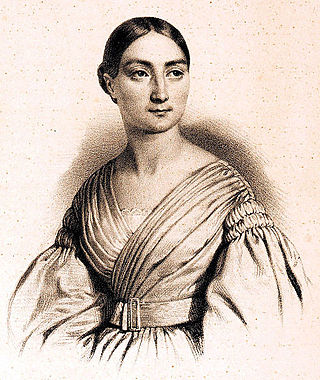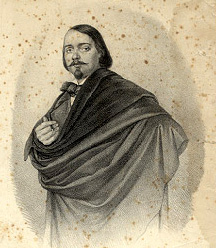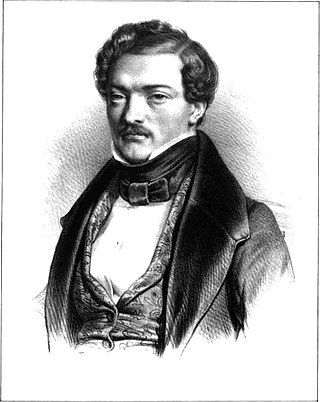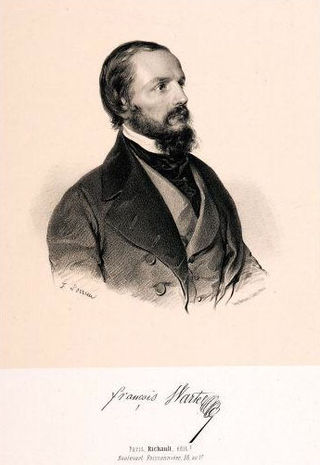Auguste Nourrit (1808-1853) was a 19th-century French tenor and opera director, younger brother of famous Adolphe Nourrit and son of tenor Louis Nourrit.
Auguste Nourrit made his debut at the Opéra-Comique of Paris in 1826 and stayed there a few years before moving to the Hague in 1833 in order to head the Théâtre français.
After a brief stint at the Comédie-Française, he directed the Theatre of Antwerp in 1836–1837. In the early 1840s, he made a long tour of the United States and Canada: he sang especially in New Orleans, New York, then in Montreal, Quebec City and Toronto.
In 1847, he was appointed director of the Théâtre de la Monnaie in Brussels but had to give up in November, due to financial meltdown.

Orfeo ed Euridice is an opera composed by Christoph Willibald Gluck, based on the myth of Orpheus and set to a libretto by Ranieri de' Calzabigi. It belongs to the genre of the azione teatrale, meaning an opera on a mythological subject with choruses and dancing. The piece was first performed at the Burgtheater in Vienna on 5 October 1762, in the presence of Empress Maria Theresa. Orfeo ed Euridice is the first of Gluck's "reform" operas, in which he attempted to replace the abstruse plots and overly complex music of opera seria with a "noble simplicity" in both the music and the drama.

Jacques-François-Fromental-Élie Halévy, usually known as Fromental Halévy, was a French composer. He is known today largely for his opera La Juive.

The Real Teatro di San Carlo, as originally named by the Bourbon monarchy but today known simply as the Teatro (di) San Carlo, is an opera house in Naples, Italy, connected to the Royal Palace and adjacent to the Piazza del Plebiscito. It is the oldest continuously active venue for opera in the world, having opened in 1737, decades before either Milan's La Scala or Venice's La Fenice.

La Juive is a grand opera in five acts by Fromental Halévy to an original French libretto by Eugène Scribe; it was first performed at the Opéra, Paris, on 23 February 1835.

Cornélie Falcon was a French soprano who sang at the Opéra in Paris. Her greatest success was creating the role of Valentine in Meyerbeer's Les Huguenots. She possessed "a full, resonant voice" with a distinctive dark timbre and was an exceptional actress. Based on the roles written for her voice her vocal range spanned from low A-flat to high D, 2.5 octaves. She and the tenor Adolphe Nourrit are credited with being primarily responsible for raising artistic standards at the Opéra, and the roles in which she excelled came to be known as "falcon soprano" parts. She had an exceptionally short career, essentially ending about five years after her debut, when at the age of 23 she lost her voice during a performance of Niedermeyer's Stradella.
The tenore contraltino is a specialized form of the tenor voice found in Italian opera around the beginning of the 19th century, mainly in the Rossini repertoire, which rapidly evolved into the modern 'Romantic' tenor. It is sometimes referred to as tenor altino in English books.

Poliuto is a three-act tragedia lirica by Gaetano Donizetti from the Italian libretto by Salvadore Cammarano, which was based on Pierre Corneille's play Polyeucte written in 1641–42. It reflected the life of the early Christian martyr Saint Polyeuctus.

Robert le diable is an opera in five acts composed by Giacomo Meyerbeer between 1827 and 1831, to a libretto written by Eugène Scribe and Germain Delavigne. Robert le diable is regarded as one of the first grand operas at the Paris Opéra. It has only a superficial connection to the medieval legend of Robert the Devil.

Louis-Auguste Florimond Ronger, who used the pseudonym Hervé, was a French singer, composer, librettist, conductor and scene painter, whom Ernest Newman, following Reynaldo Hahn, credited with inventing the genre of operetta in Paris.

Adolphe Nourrit was a French operatic tenor, librettist, and composer. One of the most esteemed opera singers of the 1820s and 1830s, he was particularly associated with the works of Gioachino Rossini and Giacomo Meyerbeer.
The haute-contre was the primary French operatic tenor voice, predominant in French Baroque and Classical opera, from the middle of the seventeenth century until the latter part of the eighteenth century.

Gilbert-Louis Duprez was a French tenor, singing teacher and minor composer who famously pioneered the delivery of the operatic high C from the chest. He also created the role of Edgardo in the popular bel canto-era opera Lucia di Lammermoor in 1835.
John Aler was an American lyric tenor who performed in concerts, recitals, and operas. He was particularly known for his interpretations of the works of Mozart, Rossini, Donizetti, Bellini, and Handel.
Auguste Charles Paul Friant was a French tenor.

Rosine Stoltz was a French mezzo-soprano. A prominent member of the Paris Opéra, she created many leading roles there including Ascanio in Berlioz's Benvenuto Cellini, Marguerite in Auber's Le lac des fées, the title role in Marie Stuart, and two Donizetti heroines, Léonor in La favorite and Zayda in Dom Sébastien.

Agustarello Affre was a French operatic tenor. He possessed a powerful, firm and exceptionally beautiful voice which garnered him the nickname the "French Tamagno" in comparison to the great Italian tenor. He was one of the leading operatic tenors in Paris from 1890 to 1911. He spent the last years of his career singing and directing operas in the United States. After World War I, he lived in retirement in France.

Pierre-François Wartel was a French tenor and music educator. His wife was Thérèse Wartel, a talented pianist, and their son Émile was a bass who sang and created several operatic roles between 1857 and 1870 at the Théâtre Lyrique and later founded his own singing school.

Jean-Étienne-Auguste Massol was a French operatic tenor and later baritone who sang in the world premieres of many French operas.

Louis Nourrit was an early 19th-century French tenor. Throughout his operatic career, Nourrit also operated as a diamond merchant.

L'alcôve is a one-act opéra comique with music by Jacques Offenbach to a French libretto by Philippe Auguste Pittaud de Forges, Adolphe de Leuven and Eugène Roche, first performed in 1847 and one of the earliest surviving stage works in the composer's long career.